什麼是惡意軟體 HackTool:Win32/Keygen?如何去除?

您是否掃描過您的設備並發現它感染了 HackTool:Win32/Keygen?在您使用破解或金鑰產生器啟動進階軟體後,Windows Defender 可能會自動警告您有關此惡意軟體的存在。
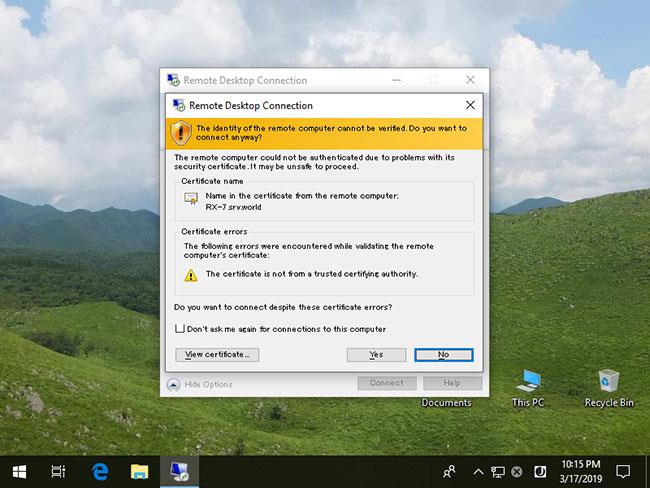
微軟正在創建一個內建的磁碟使用命令列實用程序,用於報告資料夾使用了多少磁碟空間。
隨著時間的推移,儲存空間不足並且不知道哪些程式或檔案正在佔用硬碟空間是很常見的。以前,用戶需要下載 TreeSize 等免費工具來列出使用空間最多的資料夾。
在使用上週發布的新 Windows 10 Insider 版本 20277 和 21277 進行測試時,一些人發現微軟已經悄悄推出了一個新的磁碟使用實用程式。該實用程式可以掃描整個磁碟機或指定資料夾並報告每個資料夾的使用量。
磁碟使用情況,Windows 10 上新的硬碟容量分析工具
磁碟使用情況位於C:\Windows\System32\diskusage.exe ,輸入diskusage /?時會顯示使用說明, 如下圖所示。
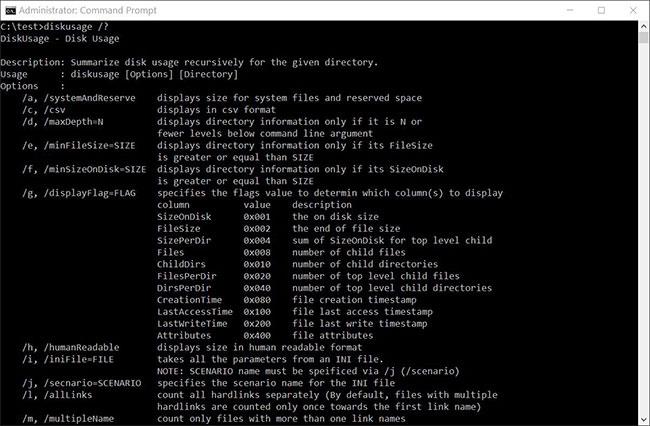
磁碟使用說明
該程式處於開發的早期階段,某些功能無法如預期運作,且使用手冊中存在一些拼字錯誤。
對於有興趣的人,以下是完整的使用說明:
DiskUsage - Disk Usage
Description: Summarize disk usage recursively for the given directory.
Usage : diskusage [Options] [Directory]
Options :
/a, /systemAndReserve displays size for system files and reserved space
/c, /csv displays in csv format
/d, /maxDepth=N displays directory information only if it is N or
fewer levels below command line argument
/e, /minFileSize=SIZE displays directory information only if its FileSize
is greater or equal than SIZE
/f, /minSizeOnDisk=SIZE displays directory information only if its SizeOnDisk
is greater or equal than SIZE
/g, /displayFlag=FLAG specifies the flags value to determin which column(s) to display
column value description
SizeOnDisk 0x001 the on disk size
FileSize 0x002 the end of file size
SizePerDir 0x004 sum of SizeOnDisk for top level child
Files 0x008 number of child files
ChildDirs 0x010 number of child directories
FilesPerDir 0x020 number of top level child files
DirsPerDir 0x040 number of top level child directories
CreationTime 0x080 file creation timestamp
LastAccessTime 0x100 file last access timestamp
LastWriteTime 0x200 file last write timestamp
Attributes 0x400 file attributes
/h, /humanReadable displays size in human readable format
/i, /iniFile=FILE takes all the parameters from an INI file.
NOTE: SCENARIO name must be speificed via /j (/scenario)
/j, /secnario=SCENARIO specifies the scenario name for the INI file
/l, /allLinks count all hardlinks separately (By default, files with multiple
hardlinks are counted only once towards the first link name)
/m, /multipleName count only files with more than one link names
/n, /nameFilter=FILTER count only files whose name matches the name filter
/p, /preferredPath=PATH count files with multiple link names towards the first link that's
under PATH if it exists
NOTE: This options must not be specified togerther
with /l (/allLinks)
/q, /virtual recurse into virtual directories
/r, /skipReparse skip recursing into reparse directories
/s, /skipResurse skip recursing into child directories when calculating sizes
/t, /TopDirectory=N displays Top N directories by SizeOnDisk in descending order
/u, /TopFile=N displays Top N files by SizeOnDisk in descending order
/v, /verbose displays verbose error information
/x, /clearDefault do not display the default selected columns測試新的磁碟使用實用程式
微軟的新磁碟使用工具正處於開發的早期階段,因此它非常基礎。讓我們看看它是如何工作的。
預設情況下,執行「磁碟使用情況」時,它會以位元組為單位報告檔案和資料夾容量,這不如以 MB、GB 等單位顯示容量有用。幸運的是,Microsoft 包含了參數 .a / h來顯示人類可讀的容量。在下面的範例中使用。
在虛擬機器上執行此測試時,例如沒有安裝大量資料或大型程序,因此本文使用C:\Windows資料夾進行測試。
由於該工具需要管理權限,因此在使用diskusage.exe之前,您必須先在Windows 10上以管理員權限開啟命令提示符,否則會顯示錯誤。
例如,若要查看 C:\Windows 中大於 1GB 的資料夾,請執行下列命令:
diskusage /minFileSize=1073741824 /h c:\windows如下所示,磁碟使用情況列出了所有大於 1GB 的資料夾,包括 C:\Windows 資料夾。
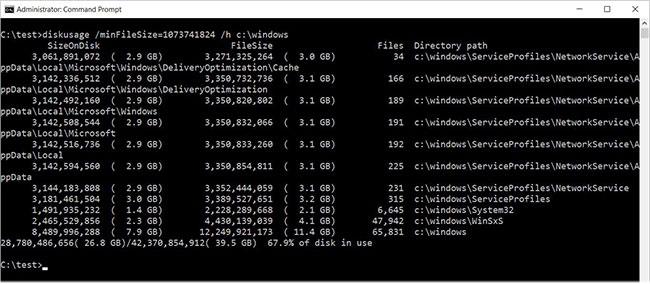
C:\Windows 中大於 1GB 的資料夾
磁碟使用情況還包括列出磁碟機或指定資料夾中前 N 個(數量)的資料夾的功能。為此,請使用命令/t=[number],如下所示:
diskusage /t=5 /h c:\windows不幸的是,該命令的輸出並不符合預期。如下所示,它顯示了 5 個資料夾的排序列表,但根據前面的命令,它們不是範例所期望的資料夾。
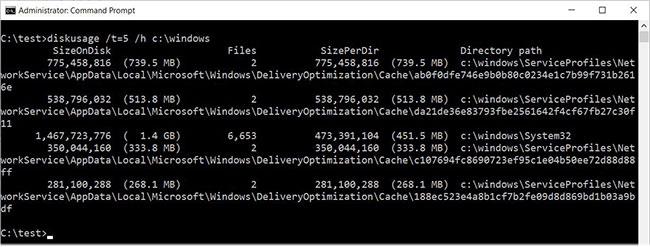
C:\Windows下容量最大的5個資料夾
文章猜測上述指令顯示最大的資料夾,而不考慮其子資料夾中的檔案。
磁碟使用情況還包括其他功能,例如使用/u選項列出最大的文件,如下列命令所示:
diskusage /u=5 /h c:\windows如下所示,磁碟使用情況顯示 5 個最大的文件,而不是顯示 5 個最大的資料夾。
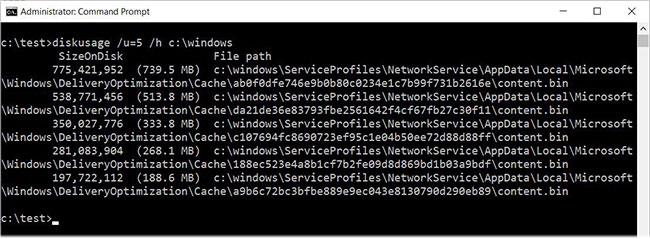
C:\Windows下容量最大的5個文件
磁碟使用情況中包含的其他功能包括建立包含要自動使用的選項的設定檔、輸出自訂以及忽略不同類型資料夾的功能。
如前所述,磁碟使用仍處於早期階段,目前還沒有關於何時正式出現的資訊。現在您可以透過安裝最新的 Windows 10 Insider 版本來測試它。
您是否掃描過您的設備並發現它感染了 HackTool:Win32/Keygen?在您使用破解或金鑰產生器啟動進階軟體後,Windows Defender 可能會自動警告您有關此惡意軟體的存在。
探索如何在Windows 10上建立和管理還原點,這是一項有效的系統保護功能,可以讓您快速還原系統至先前狀態。
您可以使用以下 15 種方法輕鬆在 Windows 10 中開啟<strong>裝置管理員</strong>,包括使用命令、捷徑和搜尋。
很多人不知道如何快速顯示桌面,只好將各個視窗一一最小化。這種方法對於用戶來說非常耗時且令人沮喪。因此,本文將向您介紹Windows中快速顯示桌面的十種超快速方法。
Windows Repair 是一款有效的 Windows 錯誤修復工具,幫助使用者修復與 Internet Explorer、Windows Update 和其他重要程式相關的錯誤。
您可以使用檔案總管選項來變更檔案和資料夾的工作方式並控制顯示。掌握如何在 Windows 10 中開啟資料夾選項的多種方法。
刪除不使用的使用者帳戶可以顯著釋放記憶體空間,並讓您的電腦運行得更流暢。了解如何刪除 Windows 10 使用者帳戶的最佳方法。
使用 bootsect 命令能夠輕鬆修復磁碟區引導程式碼錯誤,確保系統正常啟動,避免 hal.dll 錯誤及其他啟動問題。
存檔應用程式是一項功能,可以自動卸載您很少使用的應用程序,同時保留其關聯的檔案和設定。了解如何有效利用 Windows 11 中的存檔應用程式功能。
要啟用虛擬化,您必須先進入 BIOS 並從 BIOS 設定中啟用虛擬化,這將顯著提升在 BlueStacks 5 上的效能和遊戲體驗。








